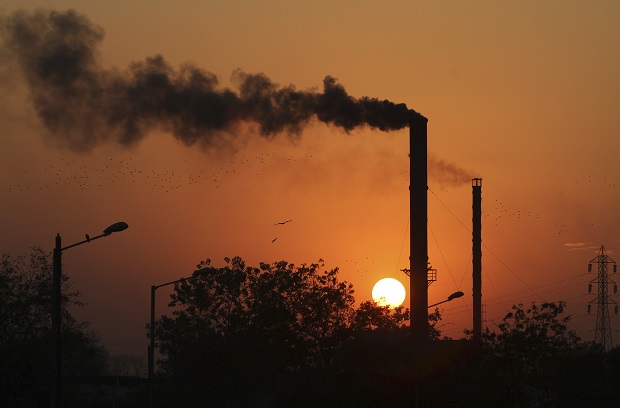Cautious hopes as UN adopts draft climate change deal
LE BOURGET, France — Negotiators from 195 nations agreed on a draft Saturday for a pact to save mankind from disastrous global warming, raising hopes that decades of arguments will finally end with a historic deal in Paris.
The planned pact would aim to break the world’s dependence on fossil fuels, slashing the greenhouse gas emissions from burning oil, coal and gas that are causing temperatures to rise dangerously.
UN negotiations dating back to the early 1990s have failed to forge unity between rich and poor nations, and the Paris talks are being described as the “last, best chance” to save mankind.
They began on Monday with a gathering of 150 world leaders, and the next crucial phase ended Saturday with the adoption of a draft text of an agreement.
The dense 48-page document agrees on the need for urgent action to combat climate change, but contains wide gaps on the most contentious issues.
Article continues after this advertisementNegotiators finalized the draft after an often tense week of talks in Le Bourget on the northern outskirts of Paris.
Article continues after this advertisementAnd while ministers still need to resolve many extremely contentious points during a scheduled five days of talks starting Monday, delegates said they felt the foundations had been laid for success.
“While we are talking, greenhouse gases are being emitted and at some point it becomes irreversible. So we must succeed,” said French Foreign Minister Laurent Fabius, presiding over the talks.
“We are talking about life itself.”
After the draft was adopted to loud applause, South African negotiator Nozipho Mxakato-Diseko drew on her nation’s revered democracy icon in a bid to inspire others.
“In the words of Nelson Mandela, it always seems impossible until it is done,” she said.
Exciting time in history
More than 50 well-known figures, from US actor Sean Penn to Chinese internet tycoon Jack Ma, also gathered at the conference Saturday to help build momentum.
“Perhaps this is the most exciting time in human history,” Penn told a special event at the conference.
“Those illusions of having too many difficult choices have always created chaos. Now we live in a time where there are no choices.”
Scientists warn our planet will become increasingly hostile for mankind as it warms, with rising sea levels that will consume islands and eat away at populated coasts, as well as catastrophic storms and droughts.
Small island nations vulnerable to rising sea levels, which are often railroaded by the powerful in the climate talks, also expressed cautious optimism about the draft agreement.
“We would have wished to be further along than we are at this point, but the text being forwarded so far reflects our key priorities,” said Thoriq Ibrahim from the Maldives.
No guarantees
But no one in Le Bourget is under the illusion that a December 11 deal is guaranteed.
“Let’s be frank: all the difficult political issues remain unresolved,” European Climate and Energy Commissioner Miguel Arias Canete said. “Next week is the week of compromise.”
One reason for optimism in Paris has been most countries’ submission of voluntary plans to curb their emissions from 2020, when the pact would come into force.
Scientists say these pledges, if fulfilled, would still fall far short of what is needed to cap warming at 2.0 degrees Celsius (3.6 degrees Fahrenheit) below pre-Industrial Revolution levels.
But they have taken the world away from a trajectory of even more dangerous warming.
Now, though, there is deep disagreement on how to structure a review process for these national plans.
The stock takes would take place every five years but there is division over when they would begin and if they would seek to strengthen countries’ commitments, or just review them.
Another fundamental issue still up for debate is what temperature limit to aim for. A majority of nations, mostly the smaller ones, want to aim for 1.5 degrees C.
But the United States, China, India and some of the other biggest polluting nations want to enshrine 2 degrees C as the goal, which would allow them to emit more gases for longer.
Money has long been one of the biggest sticking points in the UN negotiations, and it remains so in Paris.
Poorer countries are demanding finance to pay for the costly shift to renewable technologies, as well as to cope with the impact of climate change.
But developing nations say rich nations are refusing to honor previous commitments to muster 100 billion euros a year from 2020 to finance the shift to clean energy and shore up climate defenses.
Marshall Islands Foreign Minister Tony de Brum said those commitments were now tainted with “creative accounting”.
“This has continued to scratch away at the bonds of trust and so our partners need to quickly put their finance card on the table,” he said.
